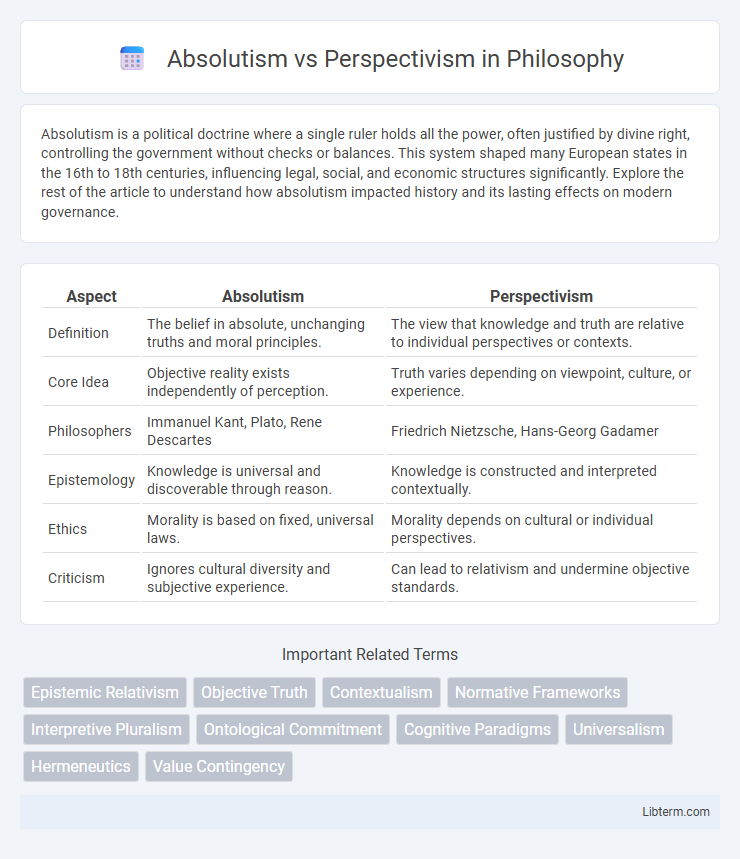Absolutism is a political doctrine where a single ruler holds all the power, often justified by divine right, controlling the government without checks or balances. This system shaped many European states in the 16th to 18th centuries, influencing legal, social, and economic structures significantly. Explore the rest of the article to understand how absolutism impacted history and its lasting effects on modern governance.
Table of Comparison
| Aspect | Absolutism | Perspectivism |
|---|---|---|
| Definition | The belief in absolute, unchanging truths and moral principles. | The view that knowledge and truth are relative to individual perspectives or contexts. |
| Core Idea | Objective reality exists independently of perception. | Truth varies depending on viewpoint, culture, or experience. |
| Philosophers | Immanuel Kant, Plato, Rene Descartes | Friedrich Nietzsche, Hans-Georg Gadamer |
| Epistemology | Knowledge is universal and discoverable through reason. | Knowledge is constructed and interpreted contextually. |
| Ethics | Morality is based on fixed, universal laws. | Morality depends on cultural or individual perspectives. |
| Criticism | Ignores cultural diversity and subjective experience. | Can lead to relativism and undermine objective standards. |
Introduction to Absolutism and Perspectivism
Absolutism asserts that certain truths or moral principles are universally valid and unchanging regardless of context or individual perspective. Perspectivism, in contrast, argues that knowledge and truth are always influenced by particular viewpoints, cultural backgrounds, or subjective experiences. This philosophical debate highlights the tension between objective certainty and the variability of human perception in understanding reality.
Defining Absolutism: Core Principles
Absolutism is defined by the belief in universal, unchanging truths that apply to all contexts and situations regardless of individual perspectives. Core principles include objective morality, fixed standards of knowledge, and the assertion that reality exists independently of human interpretation. This philosophy contrasts with relativist views by emphasizing certainty, permanence, and absolute authority in ethical and epistemological claims.
Understanding Perspectivism: Key Concepts
Perspectivism, a philosophical approach largely associated with Friedrich Nietzsche, emphasizes the idea that knowledge and truth are always interpreted through individual perspectives, rejecting absolute or universal truths. Key concepts include the acknowledgment of multiple viewpoints shaped by cultural, historical, and psychological factors, highlighting that all claims to truth are inherently subjective and context-dependent. This challenges absolutism, which asserts fixed, objective truths independent of human perception or interpretation.
Historical Development of Absolutism
Absolutism emerged in the 16th and 17th centuries as a political doctrine advocating centralized sovereignty under a monarch with absolute authority, exemplified by rulers such as Louis XIV of France. This philosophy grew from the decline of feudalism, the rise of centralized states, and the influence of thinkers like Jean Bodin, who argued for unchallengeable sovereign power. Absolutism shaped European governance by reinforcing monarchs' control over legislation, military, and judiciary, setting the stage for later political theories like Perspectivism that challenged absolute certainties.
Origins and Evolution of Perspectivism
Perspectivism originated in the 19th century, heavily influenced by Friedrich Nietzsche's critique of absolute truths and his assertion that knowledge is always interpreted from a particular perspective. This philosophical stance evolved as a reaction against the rigid frameworks of Absolutism, arguing that all beliefs and truths are contingent upon individual or cultural viewpoints. Over time, Perspectivism expanded to encompass diverse fields such as epistemology, ethics, and cultural theory, emphasizing the multiplicity of perspectives shaping human understanding.
Absolutism in Ethics and Morality
Absolutism in ethics asserts that certain moral principles are universally valid and unchanging, regardless of context or individual perspective. It maintains that actions are intrinsically right or wrong, based on objective criteria such as natural law or divine command. This framework opposes Perspectivism by denying that morality varies with cultural, situational, or personal viewpoints.
Perspectivism in Philosophy and Epistemology
Perspectivism in philosophy and epistemology asserts that knowledge and truth are always interpreted through individual perspectives shaped by cultural, historical, and social contexts, rejecting absolute or universal truths. This approach emphasizes the relativity of viewpoints, arguing that understanding is contingent and multifaceted rather than fixed or singular. Prominent philosophers like Friedrich Nietzsche championed perspectivism, highlighting its role in challenging dogmatic beliefs and promoting critical inquiry.
Practical Implications: Absolutism vs Perspectivism
Absolutism enforces rigid ethical standards that guide decision-making with clear-cut rules, offering consistency but limiting flexibility in complex situations. Perspectivism promotes adaptive moral judgments based on individual viewpoints and cultural contexts, enhancing empathy but potentially leading to relativism and ethical ambiguity. Practical implications of these approaches impact legal systems, organizational policies, and interpersonal relationships by shaping how right and wrong are determined and applied.
Criticisms and Limitations of Both Approaches
Absolutism faces criticism for its rigidity and inability to account for context and cultural diversity, often leading to dogmatic interpretations and ethical inflexibility. Perspectivism is limited by its potential to foster relativism, undermining objective standards and making consensus and truth claims problematic. Both approaches struggle with balancing universal principles and subjective interpretations, resulting in ongoing philosophical debates about the nature of truth and morality.
Conclusion: Comparing Absolutism and Perspectivism
Absolutism asserts universal moral truths applicable across all contexts, emphasizing objective standards and unchanging principles. Perspectivism recognizes that moral judgments are influenced by individual or cultural viewpoints, highlighting the relativity and variability of ethical values. Comparing these philosophies reveals a tension between rigid, universal ethics and adaptable, context-dependent morality, challenging the possibility of a single, absolute truth.
Absolutism Infographic

 libterm.com
libterm.com